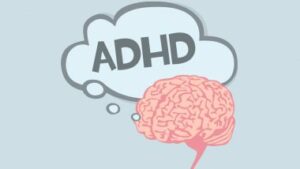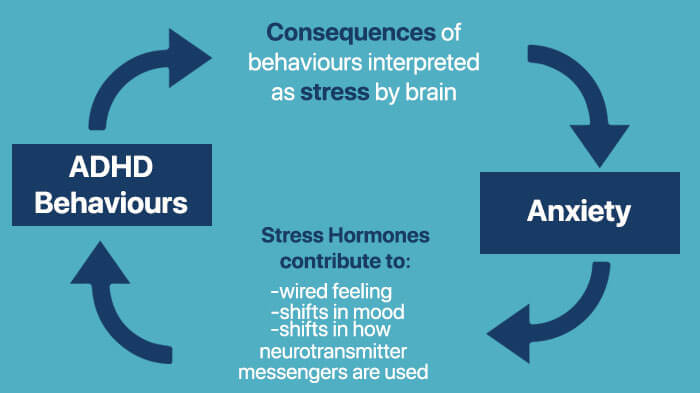Attention Deficit Hyperactivity Disorder (ADHD) and anxiety disorders share some common features, such as difficulty paying attention, overactivity, and impulsiveness. This article will explore the relationship between ADHD and anxiety in depth and look at ways to manage both conditions.
Contents
What is ADHD?

ADHD stands for Attention Deficit Hyperactivity Disorder. ADHD is a disorder that affects how a person’s brain works. It is characterized by difficulty paying attention, staying focused, and behaving appropriately. People with ADHD may have trouble controlling their impulses and may be very active and noisy. This disorder is often treated with medication, therapy, and lifestyle changes.
ADHD can be very serious and can lead to problems in school, at work, and with relationships. If left untreated, ADHD can lead to substance abuse, depression, and criminal behavior.
What is Anxiety?

Anxiety is a feeling of worry, fear, and uneasiness. It often occurs when a person is exposed to potential danger or when they are faced with something new or unfamiliar.
The most common symptoms of anxiety include restlessness, muscle tension, headaches, trouble sleeping, and a sense of dread.
Many people with anxiety also experience mood swings, such as feeling happy one minute and sad the next.
There is no one-size-fits-all approach to managing anxiety, but many people find that using techniques like breathing exercises and relaxation techniques helps to relieve their symptoms.
Also, anxiety is sometimes called “the anxiety disorder.” People with anxiety disorders experience intense anxiety for an extended period, and their anxiety limits their life in ways that are significant and impactful. Types of anxiety disorders include generalized anxiety disorder, social anxiety disorder, obsessive-compulsive disorder (OCD), panic disorder, and separation anxiety disorder.
What Are The Symptoms of ADHD and Anxiety?

There is a close relationship between ADHD and anxiety, with both disorders often co-occurring. ADHD is a disorder characterized by chronic problems with focus, hyperactivity, and impulsiveness. Anxiety is a syndrome characterized by feelings of fear, worry, and insecurity. People with ADHD may have difficulty sustaining attention and interacting appropriately with others. Anxiety can make it difficult for people with ADHD to stay organized and manage their time.
However, there are some common signs of ADHD and anxiety that may not always be present. Some of these are:
Mood Changes
This is one of the most common signs that ADHD and other disorders are related. People with ADHD may experience mood swings, from feeling hyperactive and energetic to feeling overwhelmed and frustrated. Anxiety can also cause a person to feel moody, anxious, or paranoid.
Physical Changes
People with ADHD may have difficulty paying attention, which can lead to problems with physical coordination. This can make it difficult for them to stay on task in activities like homework or chores, as well as during social interactions. People with anxiety may also experience physical changes like increased heart rate, chest pain, and headaches.
Trouble Sleeping
People with ADHD and anxiety often have trouble sleeping. This is partly because ADHD medications can make people feel hyperactive and anxious, while anxiety can lead to trouble sleeping because of the worry and tension it causes.
In addition, people with both ADHD and other disorders may find it difficult to fall asleep or stay asleep due to the frequent sleep disturbances that accompany their disorders.
Behavior Changes
Both ADHD and anxiety can lead to changes in behavior. People with ADHD may have difficulty following directions and completing tasks, while people with anxiety may become more anxious and paranoid in social situations. These changes can make it difficult to succeed in school or work or to maintain relationships.
How are ADHD and Anxiety Related?

ADHD is a disorder that is characterized by problems with focus, attention, and hyperactivity. Anxiety is a general term that refers to feeling worried, fearful, or anxious. People with ADHD may experience higher levels of anxiety than people without ADHD. Some research suggests that people with ADHD are more likely to have a disorder called anxiety spectrum disorder (ASD). ASD is a condition that includes disorders like anxiety, OCD, and bipolar disorder.
There is some evidence to suggest that ADHD and ASD are related. People with ADHD may have a harder time focusing on tasks and may have trouble regulating their emotions. These same problems can lead to problems with social interactions and can make it difficult for kids with ADHD to stay organized. Kids with ASD may also have problems with focus and attention, but they may also have strong emotional reactions. As a result, kids with ASD may be more prone to developing anxiety disorders.
Also, It’s important to remember that not all kids who have an anxiety disorder have ADHD. It’s estimated that around 60% of kids who have an anxiety disorder don’t have ADHD. However, ADHD and anxiety are frequently co-occurring, so it’s important to talk to your child’s doctor if you think your child may have ADHD and an anxiety disorder.
Sometimes there may be other causes of anxiety, such as depression or a learning disability. If your child has other symptoms such as problems sleeping, headaches, stomachaches, or problems concentrating, it may be worth checking for ADHD and anxiety as well.
How Can ADHD and Anxiety Be Treated?

there are a few ways to approach the treatment of ADHD and other disorders together.
One approach is to try to identify the root cause of anxiety in individuals with ADHD. This can be done by asking questions about their childhood and examining any trauma or stress that may have occurred. Once the cause of the anxiety is identified, treatments can be tailored to address that issue.
Another approach is to focus on reducing the symptoms of ADHD. This can be done through medication, therapy, or a combination of both. It is important to note that not all people with ADHD will need medication or therapy; some may only need reassurance and support.
There is no one-size-fits-all approach to treating ADHD and other disorders together, but these are two essential areas of treatment for individuals with both disorders.
Some of these treatment methods are:
Medications
One of the most common ways to treat ADHD and other disorders together is to take medication. ADHD medications work to improve the symptoms of the disorder, and they can also help to reduce the severity of anxiety.
There are several different ADHD medications available, and it is important to find one that is effective for the individual. Some people with ADHD may need more than one type of medication to improve their symptoms.
Therapy

Another common way to treat ADHD and anxiety together is through therapy. Therapists can help individuals with ADHD learn how to better manage their emotions and Address any underlying issues that may be contributing to their anxiety.
This type of therapy can be very helpful, but it is important to find a therapist who understands how ADHD and anxiety work together. Not all therapists are knowledgeable about this relationship, so it is important to ask about their experience treating ADHD and anxiety together.
Support Groups
Another approach is to join a support group for people with both ADHD and anxiety. This can provide individuals with a safe place to share their experiences and talk about solutions. Support groups can also provide valuable resources, such as educational materials or coping mechanisms.
There is no one-size-fits-all approach to treating ADHD and anxiety together, but these are some essential areas of treatment for individuals with both disorders.
Conclusion
Many people find that they have both ADHD and anxiety, but what is the relationship between these two disorders? Some speculate that ADHD and anxiety are related because both conditions can cause problems with focus and hyperactivity. Other experts believe that there is a genetic component to both disorders, which means they run in families. What seems clear is that there is some sort of connection between ADHD and anxiety, but it remains unclear exactly how it works.
Treatment for ADHD and anxiety together often depends on the underlying cause of the anxiety. However, there are a few approaches that can be used to help individuals with both disorders. Treatments that focus on improving symptoms like medication, therapy, or support groups can be very helpful.
Hope this article was of help to you! If you are suffering from mental health disorders, you may seek help from Therapy Mantra. We have a team of highly trained and experienced therapists who can provide you with the tools and skills necessary for overcoming mental health disorders. Contact us today to schedule an online therapy or download our free Android or iOS app for more information.


